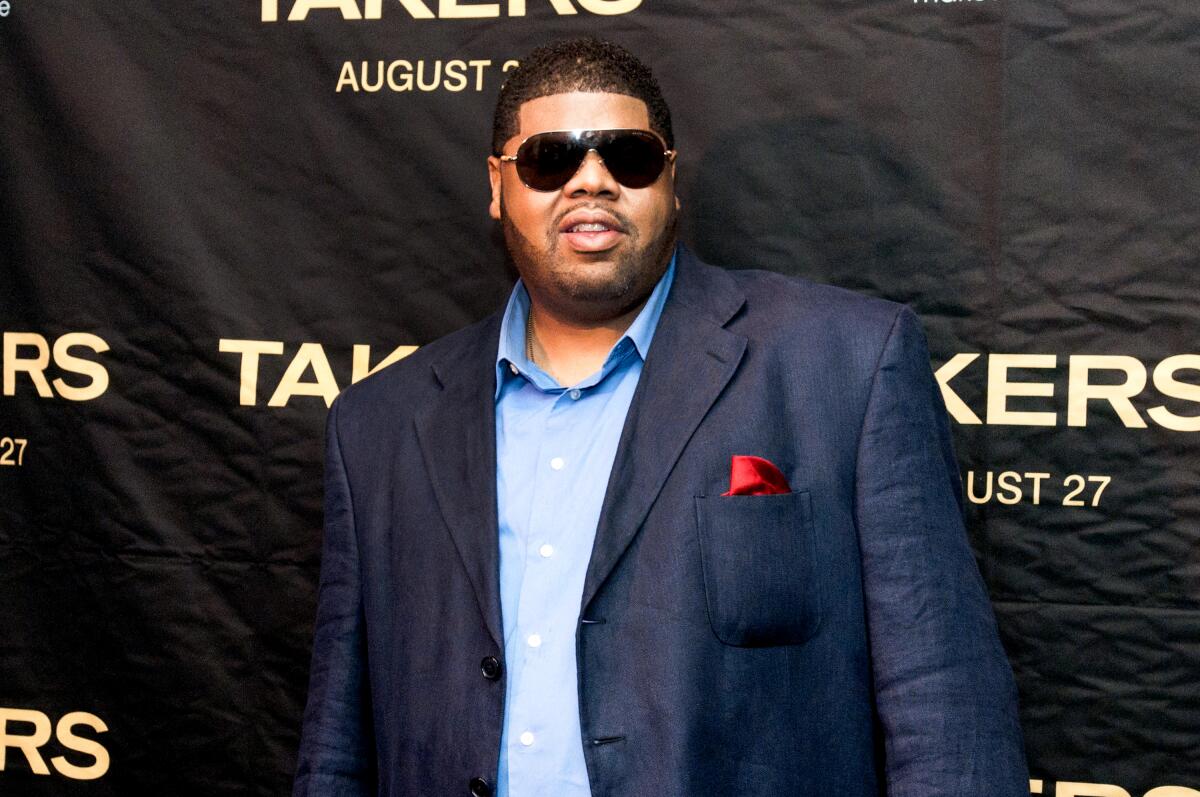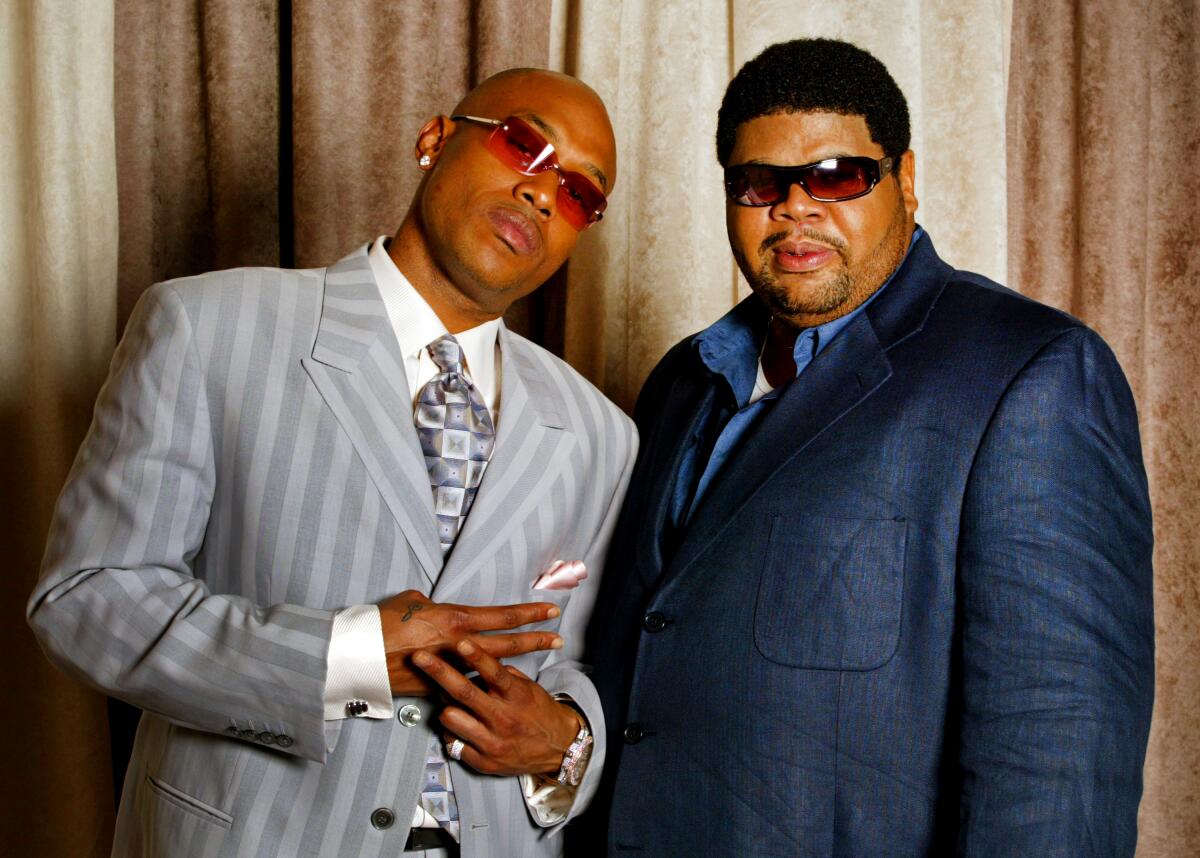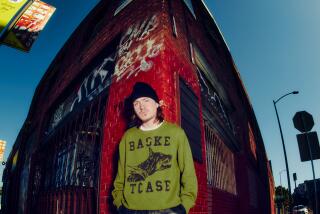Today, hip-hop and R&B are seamlessly entwined. You can thank Chucky Thompson for that

- Share via
Despite mogul and marketing wizard Sean “Diddy” Combs’ bold assertion, he and his Bad Boy Records in-house production team, the Hitmen, didn’t invent the remix.
They did, however, during the label’s indomitable peak in the mid- to late 1990s, popularize and glamorize the remix, as hip-hop and R&B began to supplant rock as the sound of popular music. Producer Carl “Chucky” Thompson, who died Aug. 9 from COVID-19 complications at age 53, was a pillar of the Hitmen — which included Deric “D-Dot” Angelettie, Nashiem Myrick, Stevie J and Mario Winans — and his fingerprints are all over some of the greatest hip-hop/R&B records of the ‘90s and 2000s. Quietly, Thompson’s resume and musical acumen reflect so much of what remains singular about those genres during that era — particularly their fusion.
The Washington, D.C., native’s ability to spot the ties between R&B and its brash offspring, hip-hop, then create something novel in the overlap was the bedrock of the Bad Boy records that helped push the label, and Black music in general, up the mountain at a pivotal time for both. He produced three songs, including the chart-topping “Big Poppa” and the original “One More Chance,” on the Notorious B.I.G.’s 1994 debut, “Ready to Die” — the album that propelled Bad Boy to a new plateau.
Thompson helped guide Mary J. Blige through the grief that inspired 1994’s “My Life,” producing almost the entirety of arguably the best R&B album of the decade. Not only did “My Life” utilize ‘70s soul samples from Barry White, Curtis Mayfield, Al Green and Roy Ayers to create the backdrop for Blige’s pain, it became the manifesto for Black women staring that pain in the face and pushing forward, even at their lowest moments.

“My Life” features background vocals from a then-unheralded Faith Evans, whom Thompson met while working on a teenage Usher’s “Think of You,” from his self-titled debut album, earlier that year. Impressed by Thompson, Evans enlisted him to produce the bulk of her debut, 1995’s “Faith.” From the snap of the drums, the intricate vocal layerings and the flourish of Thompson’s “Quiet Storm” sensibilities, “You Used to Love Me” and “Soon as I Get Home” showcase ‘90s R&B at its smoothest. Thompson was more than good taste and a deep record collection though. As he did with Blige, Thompson treasured Evans’ rough edges. Whereas most producers would have smoothed over Evans’ rawness, he harnessed it and set it to music that appealed to moms raised on Aretha and kids who knew every Biggie verse.
The ‘90s was a golden age for producers like Thompson, proficient in both hip-hop and R&B. The members of Organized Noize are best known for their work with OutKast and Goodie Mob, but they also produced TLC’s “Waterfalls” and En Vogue’s “Don’t Let Go (Love).” Jermaine Dupri was the maestro for his So So Def artists such as Xscape, but he also worked with Mase and Jay-Z. The Neptunes (N.O.R.E., Kelis, Jay-Z, and Clipse) and Timbaland (Aaliyah, Missy Elliott), mad scientists from Virginia, took apart and put back together the very sound of Black music; soon pop stars of all stripes were clamoring to work with them.
The ongoing fascination with hip-hop and R&B of the ‘90s and ‘00s has created a swell of content and commerce around it. The late Aaliyah is a point of obsession (even among fans too young to have experienced her music in real time), and the recent news that all of her music will finally be available on streaming platforms in the coming months has sparked interest 20 years after her death. The 2022 Lovers & Friends festival, with its massive, star-laden lineup, had to add a second show to keep up with demand. And the popular Verzuz series of livestreams, recently starring Bad Boy affiliated hip-hop group the Lox, provides classic R&B and hip-hop acts the opportunity to revisit their star-studded catalogs with fans old and new.

The intoxicating pull of nostalgia notwithstanding, it’s the bedrock musicality of Thompson’s body of work that makes it essential listening still. The Notorious B.I.G’s “Big Poppa” matched Biggie’s natural charisma with a satin-smooth sample of the Isley Brothers’ ”Between the Sheets.” Total’s “Can’t You See,” which features an opening verse from Biggie, is driven by a James Brown sample, the foundation for so much of hip-hop’s earlier generations. It also has crisp hip-hop drums, as does Thompson’s R&B remix of the group’s “No One Else” — which bears faint traces of the famous Boogie Down Productions sample on which the original was built.
Thompson was also an accomplished multi-instrumentalist, finding his groove as a teenager by playing the congas in go-go music deity Chuck Brown’s band, the Soul Searchers. That taught him to find the pockets in beats on the Bad Boy remix of Gina Thompson’s “The Things That You Do” and Biggie’s “I Got a Story to Tell” and “Dead Wrong.” He’s credited with playing every instrument on Blige’s “My Life.” All of the instruments heard on Biggie’s “Me & My Bitch” were played by Thompson, as was the guitar heard on the title track of “Ready to Die.” The crescendos and decrescendos of Nas’ ”One Mic” exhibit a true musician’s grasp of how volume and intensity work in concert to create atmosphere. Even when using samples, Thompson approached the music as if the instruments were right there in his hands.
“I put myself in the position of the musicians that are actually on the samples,” he told Vibe in a 1998 profile of the Hitmen. “I try to envision me being in a room with them and just catch their vibe.”

Thompson understood vibes because he understood people and music. His work was already going to live on, but it’s found new life in recent years. Kentucky singer Bryson Tiller’s “Set It Off” and “Stay Blessed,” from his 2017 album “True to Self,” sample Thompson’s work with Evans and Blige. Producer 40 and Drake have never been shy about flexing their ‘90s and ‘00s R&B bona fides, and the former made “Mary’s Joint,” from “My Life,” the skeleton for the latter’s “Weston Road Flows” on 2016’s “Views.”
Beyond the direct references to his production, Thompson’s approach is still in practice. On Tyler, the Creator’s “WUSYANAME,” from his latest album, “Call Me If You Get Lost,” he utilizes a sample from ‘90s R&B group H-Town and recruits contemporaries YoungBoy Never Broke Again and Ty Dolla Sign to create something that’s entirely his own style. Whenever you encounter hip-hop and R&B blended into something practically inseparable, you’re hearing the echoes of Chucky Thompson.
More to Read
The biggest entertainment stories
Get our big stories about Hollywood, film, television, music, arts, culture and more right in your inbox as soon as they publish.
You may occasionally receive promotional content from the Los Angeles Times.










